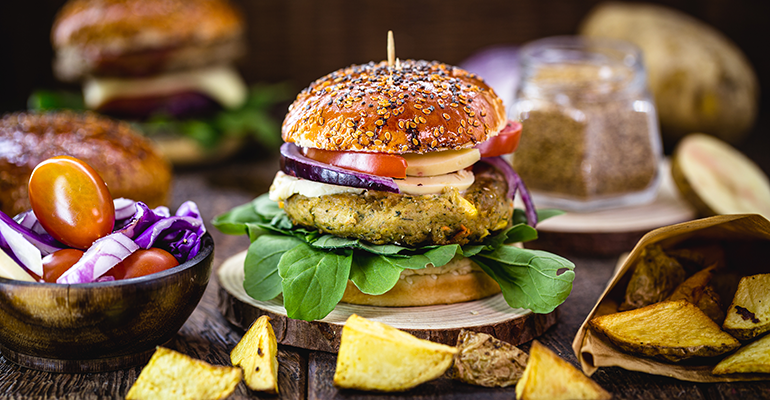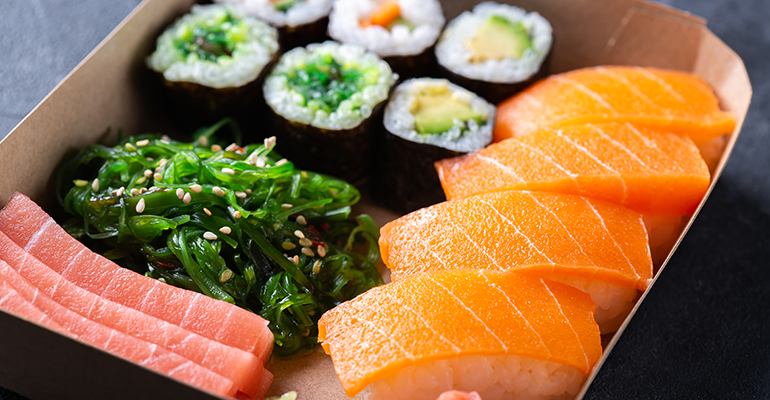Welcome to SJGLE.com! |Register for free|log in
Welcome to SJGLE.com! |Register for free|log in

Related Searches: Tea Vitamin Nutrients Ingredients paper cup packing
The focus on fish alternatives is the next stage of an industry that has seen much success in sales of plant milks and meat substitutes, buoyed on by consumer concern about food sustainability practices.

Pictured: Vegan protein burger © AdobeStock/RHJ
Along with fish, a wave of new products are making its way to the supermarket shelves as evolving manufacturing innovations also create pea-derived prawns and flaky fish fillets from macro- and microalgae.
These products join tuna, salmon, caviar, scallops, squid, and crab as plant-based seafood already available in a market that is set to fill the unmet gap in aquaculture production and wild caught fish.
According to a Informa Market Insights report, by 2030, global demand for seafood is projected to be 30% higher than 2010 levels.
So far, product development of plant-based fish and seafood has lagged behind beef, chicken and pork alternatives, accounting for just $9.5 million (€9m) or 1% of total plant-based meat dollar sales.
This indicates plenty of opportunity for both new and established brands, such as US-based firm Good Catch, which launched the first US-made plant-based salmon burger in January of this year.
Made from a six-plant blend of pea, soy, chickpea, lentil, soy, and navy bean protein, the burgers contain an impressive 16 grams of protein per serving.
Other firms in this space include New Wave Foods, Gardein, The Plant based Seafood Company, Sophie’s Kitchen, Revo Foods, Hooked, Algama, and BettaF!sh.
Israeli startup Plantish makes plant-based salmon fillet with legume proteins, algae extracts, and 3D printing to replicate conventional fish as closely as possible.
In 2020, Nestlé made its first move into plant-based seafood with a six-ingredient vegan alternative to tuna called Vuna, sold under the Garden Gourmet brand in Switzerland.
Just over a year later, the food giant made available Vrimp, its new plant-based shrimp alternative made out of seaweed and peas, with paprika and carrot used to replicate the orange shrimp colour.
“This is not just a one season fad,” said Nestlé chief executive Mark Schneider of the shift towards plant-based eating. “This is something that has very solid, longer-term growth rates.”
“With fish it is more health-related, and with beef and chicken it is more about the environment,” he said of the reasons people were interested in plant-based foods.
Latest figures by Bloomberg Intelligence suggest the plant-based market could exceed $162 billion (€154bn) by 2030, growing 451% from its 2020 market value.
The food’s credentials in healthy and sustainable eating has clearly struck a chord with venture capitalists. Investment firm Big Idea Ventures launched a $50m (€50m) New Protein Fund I. The fund has invested in five alternative-seafood companies: German-based Esencia, UK-based Food Squared, Iceland-based Loki Foods and Singapore-based ImpacFat and Sono Biosciences.
Likewise, Hooked Foods recently announced a $4m (€3.8m) investment from investors including Swedish popstar Danny Saucedo.
The brand launched its alt-seafood tuna product, Toonish, in Sweden in October touting it to be the first 100% plant-based tuna to hit the shelves in Sweden.
Although no cell-based seafood products have received regulatory approval, it was anticipated in Singapore by 2022, with sales in Japan and approval in North America, Europe, and Australia expected to follow.
 Pictured: Vegan seafood © AdobeStock/aamulya
Pictured: Vegan seafood © AdobeStock/aamulya
Indeed, earlier this year, Japan’s Health, Labor and Welfare Ministry commissioned an investigation into the safety of cultivated meat and seafood with a view to develop a future regulatory framework for cultivated proteins.
In 2020, the World Sustainability Organization (WSO) launched a certification programme for plant-based seafood products via its Friend of the Sea initiative, authorising vegan foods to position themselves as sustainable seafood.
Certified front-of-pack labels such as this could reinforce the eco-friendliness of seafood alternatives and drive further consumer interest.
E-newsletter
Tags